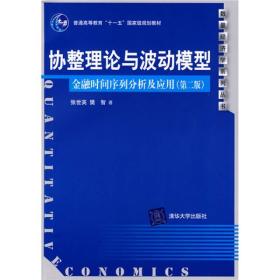
协整理论与波动模型:金融时间序列分析及应用(第2版)/普通高等教育“十一五”国家级规划教材
¥ 21.32 4.4折 ¥ 49 九品
仅1件
北京东城
认证卖家担保交易快速发货售后保障
作者张世英、樊智 著
出版社清华大学出版社
出版时间2009-05
版次2
装帧平装
货号A7
上书时间2024-12-19
- 最新上架
商品详情
- 品相描述:九品
图书标准信息
- 作者 张世英、樊智 著
- 出版社 清华大学出版社
- 出版时间 2009-05
- 版次 2
- ISBN 9787302196976
- 定价 49.00元
- 装帧 平装
- 开本 16开
- 纸张 胶版纸
- 页数 465页
- 字数 720千字
- 正文语种 简体中文
- 丛书 普通高等教育“十一五”国家级规划教材
- 【内容简介】
-
本书论述了时间序列的协整理论和金融时间序列波动性模型的原理、方法和实际应用。在时间序列的协整理论方面,包括单位根过程的极限分布和检验,单方程和系统方程协整关系的估计和检验,非线性、长记忆协整关系的建模和检验问题,协整系统的贝叶斯分析及变结构协整的理论、方法等。在金融时间序列波动模型方面,包括自回归条件异方差(ARCH)模型的各类一维和多维模型体系及各类随机波动(SV)模型的性质、模型参数估计和检验问题,讨论了变结构波动模型的建模及其应用等。金融波动性问题是当今金融分析中的重要课题,本书探讨了金融波动及其持续性的市场机制,建立了在金融波动持续性基础上的资本资产定价模型和金融风险规避策略等。书中详细讨论了高频金融时间序列分析与建模问题,研究了各类高频时间序列已实现波动率的计算方法和统计性质,讨论了超高频数据持续期的ACD类和SCD类两类模型。书中还讨论了小波方法在金融时间序列波动分析和建模方面的应用;讨论了各类连续时间资产收益模型及参数估计的MCMC方法。
本书可作为数量经济学研究人员、有关教师、经济和金融工作者的参考书,亦可作为相关领域研究生的教学参考书。 - 【作者简介】
-
张世英,男,北京市人,1960年北京大学数学力学系毕业,1970年以前在国防部第五研究院和酒泉基地从事我国早期火箭的测轨研究工作,1978年后在天津大学系统工程所和管理学院从事系统辨识,社会经济系统分析,社会经济系统建模,规划与控制等领域的研究工作,先后主持,完成八项国家自然科学基金项目,多项部,委和天津市软科学研究项目,先后获国家科技进步奖二等奖一项(1987年),原国家教委科技进步奖三等奖一项(1993年),原煤炭部管理科学优秀成果一等奖一项(1997年),天津市科技进步三等奖两项(1994年,2002年),天津市社会科学优秀成果一等奖一项(2006年),现为天津大学管理学院教授,管理科学与工程博士点博士生导师,目前已培养已获得博士学位的博士80名,硕士约250名,在社会经济系统分析,规划与控制和数量经济等领域在国内外发表大量论文,仅在数量经济方面发表论文计250余篇,主编《测量实践的数据处理》,《非均衡经济计量建模与控制》,《金融时间序列分析》等著作和教材10部,1989—1990年以访问学者身份访问美国明尼苏达大学经济系,从事非均衡经济计量建模研究,目前是“世界教科文卫组织”专家成员,并担任《系统工程学报》,《信息与控制》等多家学术刊物编委。
樊智,男,1976年生,山西人,分别于2000年3月和2003年3月在天津大学管理学院获管理学硕士和工学博士学位,师从张世英教授,曾在国内外核心学术期刊,会议发表论文近二十篇,主要研究方向为金融时间序列分析和金融工程。 - 【目录】
-
Chapter1TimeSeriesAnalysis
1.1Generaltimeseriesmodels
1.2Vectorstationarytimeseries·vectorautoregressivemodel
1.3Nonstationarystochasticprocessesandintegratedtimeseries
1.4Longmemorytimeseries
References
Chapter2TestsofUnitRootProcesses
2.1Unitrootprocesses
2.2Limitingdistributionofintegratedprocesses
2.3Testsofunitrootprocesses
2.4Vectorautoregressiveprocesseswithunitroot
References
Chapter3CointegrationTheoryandMethodology
3.1Cointegrationanderrorcorrectionmodel
3.2Estimationandtestsofcointegrationrelationshipinsingleequation
3.3Estimationandtestsofcointegrationrelationshipinsimultaneousequationsystem
3.4Bayesiananalysisofcointegratedsystem
3.5Linearconintegrationanalysisoffractionallyintegratedvectortimeseries
3.6Forecastingofcointegratedsystem
3.7Nonlineartransformationofintegratedtimeseries1
References
Chapter4SeasonalIntegrationandCointegration
4.1Seasonalintegration,cointegrationandtests
4.2Bayesiantestsofseasonalcointegration
Appendix:Lagrangepolynomialapproximationtheorem
References
Chapter5NonlinearCointegrationTheory
5.1Definitionofnonlinearcointegration
5.2Estimationandtestsofnonlinearcointegrationrelationship
5.3Existenceofnonlinearcointegrationrelationship
5.4Nonlinearcointegrationmodelingbasedonwaveletneuralnetwork
5.5Nonlinearerrorcorrectionmodelsoflinearlycointegratedsystem
5.6Nonlinearcointegrationrelationshipinlongmemoryvectortimeseries
5.7Cointegrationwithstructurechangesandmodeling
References
Chapter6ARCHClassModels
6.1ShortmemoryARCHclassmodels
6.2LongmemoryARCHclassmodels
6.3FractionallyintegratedaugmentGARCHMmodel
6.4GARCHclassmodelsforpaneldata
6.5StatisticalpropertiesofGARCHmodel
6.6ModelingofARCHclassmodels
6.7DiagnosticanalysisandstructurechangemodelingofARCHclassmodels
6.8StochasticdifferentialequationofGARCHprocess
6.9Unitroottestswithconditionalheteroskedasticity
6.10VectorGARCHmodelsandmodeling
6.11PersistenceandcopersistenceinvectorGARCHprocess
6.12Persistenceandcopersistenceinconditionalmomentsoftimeseries
References
Chapter7StochasticVolatilityModels
7.1BasicSVmodelsandstatisticalproperties
7.2ExtendedSVmodels
7.3ParametersestimationofSVmodels
7.4QMLestimationbasedonTHGAandMonteCarlo
7.5EstimationoflongmemorySVmodelsandapplications
7.6SVmodelswithstructurechanges
7.7AggregationandmarginalizationofSVmodels
7.8PersistenceandcopersistenceinSVmodels
7.9ComparisonofSVandGARCHmodels
7.10Squarerootstochasticautoregressivevolatilitymodel
References
Chapter8AnalysisofFinancialVolatility
Chapter9AnalysisandModelingforHighFrequencyFinancialTimeSeries
Chapter10WaveletMethodsforFinancialTimeSeriesAnalysis
Chapter11ContinuousTimeModelsanditsApplications
点击展开
点击收起
— 没有更多了 —












以下为对购买帮助不大的评价